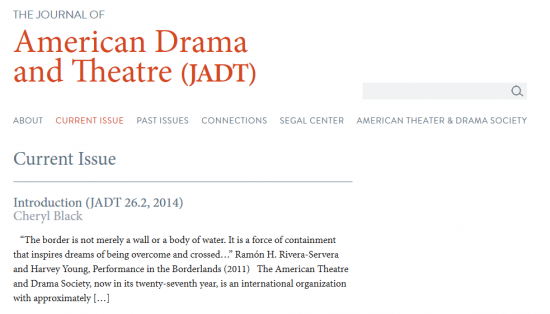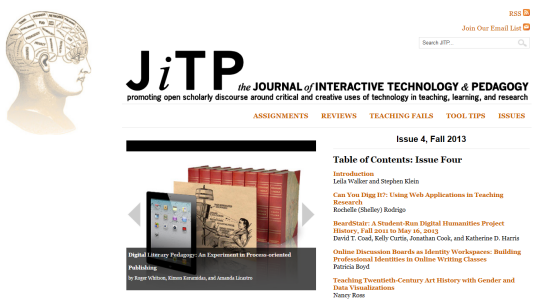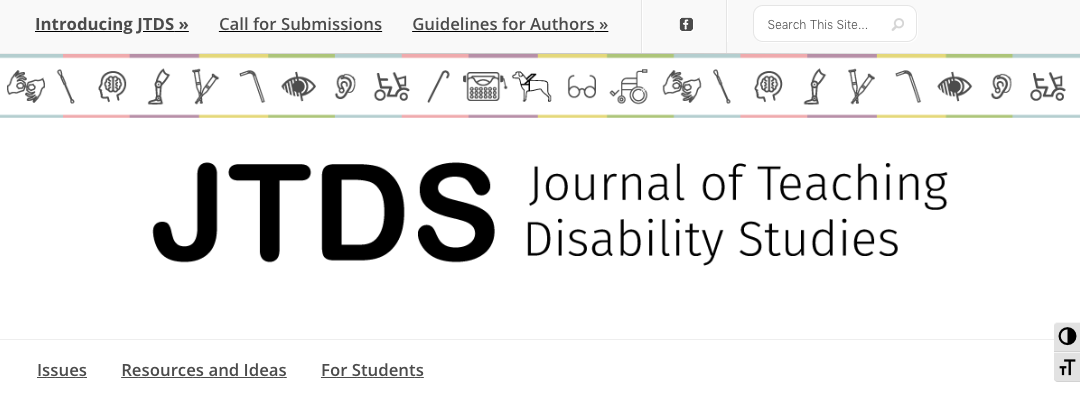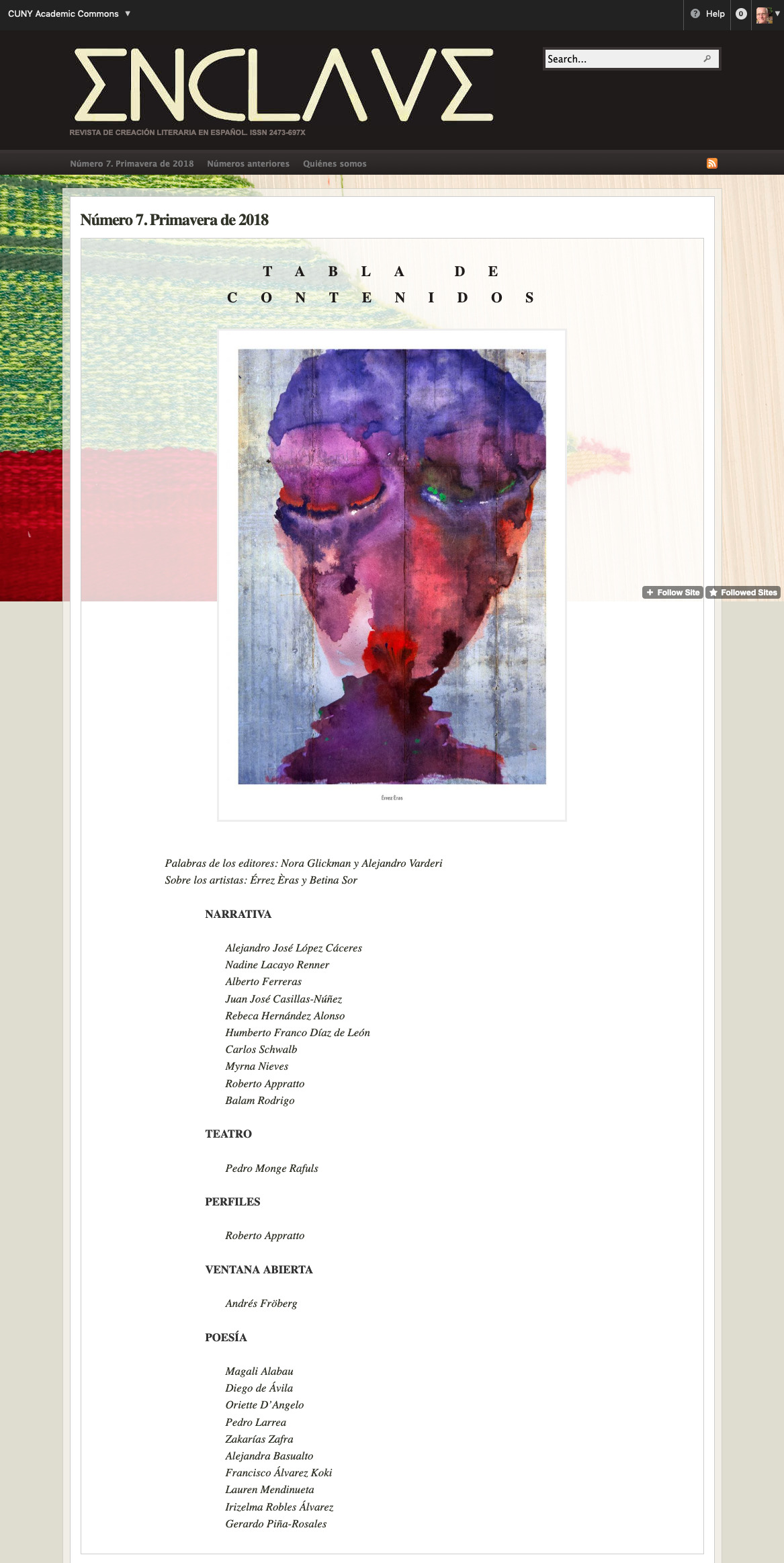The Commons is increasingly becoming a publication platform for academic journals. The Commons team works closely with the publishers to find suitable WordPress themes and plugins, coordinate domain mapping, and troubleshoot issues.
Our open access publishing platform comes with a built-in social layer. The Commons front page can be used to advertise new journal issues, list blog posts, and provide a discussion platform that keeps the conversation going via comments and tweets. Your My Commons page aggregates journal articles, comments, and news about upcoming issues once you “follow” the site.
Editors can use groups on the Commons to collaborate on new issues and share reflections on manuscripts.
The growing number of academic journals now hosted on the Commons includes:
A growing number of academic journals are now hosted on the Commons; contact our team to learn how the Commons can support your publishing project:
Journal of American Drama and Theatre (JADT)
Founded in 1989 and previously edited by Professors Vera Mowry Roberts, Jane Bowers, and David Savran, this widely acclaimed journal is now edited by Professors Naomi J. Stubbs and James F. Wilson. JADT publishes thoughtful and innovative work by leading scholars on theatre, drama, and performance in the U.S. – past and present. Provocative articles provide valuable insight and information on the heritage of American theatre, as well as its continuing contribution to world literature and the performing arts.
Journal of Interactive Technology and Pedagogy
The mission of The Journal of Interactive Technology and Pedagogy (ISSN 2166-6245) is to promote open scholarly discourse around critical and creative uses of digital technology in teaching, learning, and research. Educational institutions have often embraced instrumentalist conceptions and market-driven implementations of technology that overdetermine its uses in academic environments. Such approaches underestimate the need for critical engagement with the integration of technological tools into pedagogical practice. The JITP will endeavor to counter these trends by recentering questions of pedagogy in our discussions of technology in higher education. The journal will also work to change what counts as scholarship—and how it is presented, disseminated, and reviewed—by allowing contributors to develop their ideas, publish their work, and engage their readers using multiple formats.
We are committed first and foremost to teaching and learning, and intend that the journal itself—both in process and in product—provide opportunities to reveal, reflect on, and revise academic publication and classroom practice.
JTDS – Journal of Teaching Disabilities Studies
“The idea of this journal began at a Society for Disability Studies conference almost four years ago, when Beth Haller and I began a conversation about the need for a vehicle to encourage community and advance pedagogy in the field. Matthew Wangeman of Northern Arizona State and Suzanne Stolz, from San Diego State, were also part of that initial conversation. Around this time, Dr. Haller, Professor of Media and Mass Communication at Towson University, and Professor Wangeman created the Teaching Disability Studies Facebook page, which now has over 6,500 followers. Over the last few years, posts on that site became less focused on announcing publications or events and more focused on questions of disability studies pedagogy. Visitors to the site were seeking information about resources, assignments and course syllabi as they developed disability studies courses. It seemed as though the field was ready for a different, but related, vehicle to explore disability studies pedagogy.
When I began teaching in the early 1990’s at The City College, there were only a few programs in the country that offered disability studies courses. Now, according to the list maintained by Syracuse University, over 40 certificates, advanced certificates and degree programs have been developed. In addition to the dedicated disability studies programs, an increasing number of disability studies courses are being offered in many other academic departments, from English and the social sciences, to music and information technology.
What is meant by the term ‘disability studies’ is in itself contested academic ground. Some courses and programs that identify as ‘disability studies’ fall on the more applied side of the spectrum, while many others are immersed in the humanities and disability theory. It is my hope that this journal will help all of us identify and explore pedagogy that prioritizes the experience of people with disabilities of all ages, uses the social model as grounding philosophy, and incorporates principles of universal design in assignment and course development and delivery.”
New Labor Forum
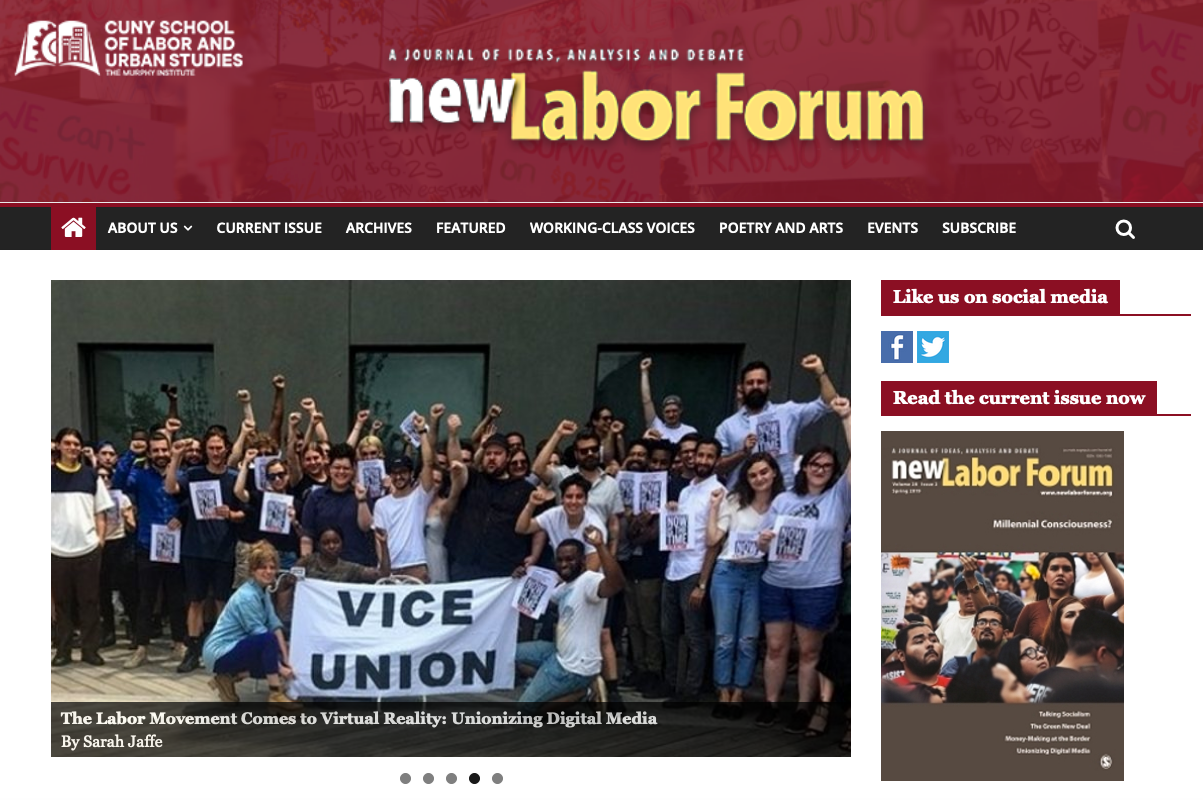
New Labor Forum is a national labor journal from the Murphy Institute, CUNY School of Labor and Urban Studies and SAGE Publishing. Published three times a year, New Labor Forum provides a place for labor and its allies to test and debate new ideas. Learn more about us from the information below.
Who We Are
Read about us, view endorsements from prominent scholars and activists, view our masthead, or contact us if you have any questions or would like more information.
What We Do
Check out our current issue and read past issues from our archives. View our latest featured stories, hear from working-class voices. And be sure to view all of the wonderful poetry and arts contributions.
Get Involved
Interested in writing for us? View our submission guidelines, and be sure to contact us with any questions.
Looking for other ways to get involved? Feel free to drop by one of our upcoming events. And be sure to sign up for our mailing list, and follow us on Facebook and Twitter, to stay in the loop on the latest New Labor Forum news and information.
Enclave – Revista de creación literaria en español.
Enclave tiene como objetivo difundir el trabajo literario en español en los Estados Unidos desde Nueva York y, más concretamente, desde la City University of New York (CUNY). Igualmente, divulgar la obra de los autores y artistas del mundo hispánico, a fin de generar un diálogo que dinamice la proyección de nuestra cultura, dentro y fuera del ámbito norteamericano, y promueva el intercambio con otras publicaciones literarias del circuito internacional. En este número, el material gráfico ha estado a cargo del artista chileno Felipe Érrez Èras y de la escultora argentina Betina Sor, aproximándonos con sus obras a las expresiones del ser, a fin de crear conciencia acerca de los males exteriores y los fantasmas interiores que afectan a los individuos en esta contemporaneidad, plagada de violencia, especialmente contra los integrantes más frágiles de nuestras sociedades.
Editores:
Nora Glickman (Queens College)
Alejandro Varderi (BMCC).
Diagramación y diseño:
Marcos Wasem (ANEP-CFE, Uruguay).
[email protected]Enclave está auspiciada por el CUNY Academy for the Humanities and Sciences.


